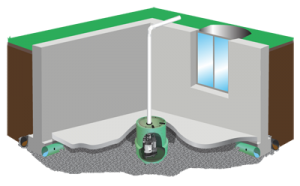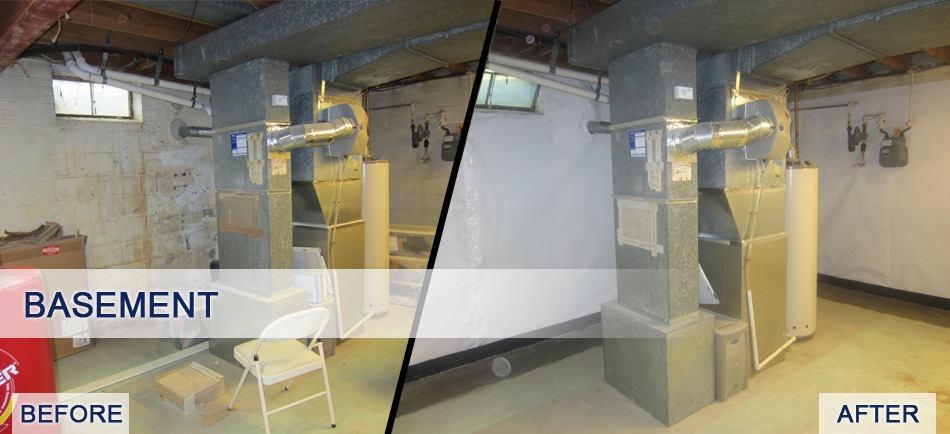- LIVE Response 8am-8pm | Saturdays 9am-5pm
- Get Financing - APPLY NOW!
- HQ: (571) 350-8292
- Maryland: (301) 841-6761
- NOrthern Virginia: (703) 721-7148
 The state of Virginia experiences higher than average precipitation annually and is one of the top 6 states most at risk of flooding. Flooding and excess moisture generate a host of problems for homeowners, most notably inflicting water damage in basements and crawl spaces. Flooding in basements and crawl spaces often results in mold, mildew, musty odors, and rotting of wooden structures. If left unaddressed, it can even destroy carpeting and other floor work and damage existing drywall. Floods are the most prevalent natural disaster in the United States, and Virginia was the source of over 1100 claims in 2012 alone for over $21.6 million.
The state of Virginia experiences higher than average precipitation annually and is one of the top 6 states most at risk of flooding. Flooding and excess moisture generate a host of problems for homeowners, most notably inflicting water damage in basements and crawl spaces. Flooding in basements and crawl spaces often results in mold, mildew, musty odors, and rotting of wooden structures. If left unaddressed, it can even destroy carpeting and other floor work and damage existing drywall. Floods are the most prevalent natural disaster in the United States, and Virginia was the source of over 1100 claims in 2012 alone for over $21.6 million.
The most common causes of wet basements and crawl spaces include:
Malfunctioning or misaligned downspouts: the purpose of a downspout is to redirect water away from the home and basement, but if the positioning of the downspout permits accumulated water to flow against the side of the home, the water may end up draining directly into the basement.
Surface water: this includes rainwater, melting snow, or flood water which pools on top of the ground. Homeowners with sloping properties are most at risk, as water can trickle in through window wells or cracks in the foundation walls.
Groundwater: When the soil surrounding homes becomes saturated after floods or melting snow, the water in the ground can exert force against the floor of your foundation and permeate inside. If water in your basement seems to only come from the outside foundation walls, the issue is probably surface water that has not properly drained. If your gutters are working and you have sealed any apparent holes, but the water is still pouring down your basement or crawlspace from the upper portions of the foundation walls, surface water is not draining away from your home the way it is supposed to. As the water continues to erode your basement and surrounding landscape, it could affect the integrity of your homes foundation.
Stairwells: If you have a leak in your basement, either in the lower part of your walls or in the seams where your walls meet your floor, the hydrostatic pressure is the issue that is pushing water upwards from the ground. The most common places where water is getting into your basement are from basement cracks in your walls and floors. If you are able to access your basement from the outside of your home, a staircase leading to your entryway can be an ideal way for water to enter your basement.
Inadequate Drainage: Basement floor drains carry water out from underneath a home, and they can clog, cause smells, and let water return into a basement. Instead, all of the downspout water either re-enters the perimeter of the basement walls, or comes up through the floor drain. If your basement is constantly damp for long periods of time after storms, or if water is coming up through your basement floor, flowing down through the walls, or bubbling where the walls meet the floor, then you likely have a problem with underground water.
Plumbing or Appliance Failure: A damaged or burst pipe, cracked washing machine tubing, or failed hot water heater could lead to major basement flooding. Whether water that enters the basement is a trickle, a slow drip, or a flood, basement water causes a variety of problems, including damaged carpet, drywall, joists, and dreaded mold.
Should you encounter moisture in your basement or crawl space, the experts at Basement Masters Waterproofing specialize in interior and exterior water drainage systems and have cultivated an array of solutions to eradicate the problem and prevent further damage to your property.
One of the most effective tools offered by Basement Masters Waterproofing is sump pumps. Sump pumps remove water that has accumulated in sump basins, which are usually located in the basement of homes. They redirect water away from the house and into a problematic area such as a municipal storm drain or a dry well.
Basements Masters Waterproofing offers a variety of products and services to combat wet basements and crawl spaces, including:
Crawl space vapor barriers: since crawl spaces do not usually account for very much square footage, they are often one of the most neglected parts of the home. Although they are small, they can contribute greatly to structural problems or water damage. Basement Masters Waterproofing is an expert in establishing vapor barriers in crawl spaces which are used to prevent moisture from seeping through the ground and disturbing the air quality of the home. Composed of puncture resistant, high tensile material, they are an effective way to ensure that moisture from the soil cannot penetrate the inside walls.
Epoxy injections: wall cracks are serious structural problems and can lead to water damage. By injecting epoxy or polyurethane into the cracks of basement walls or crawl spaces, the concrete structure is further reinforced and even stronger than before. This is an effective and economical solution for shrinking or structural cracks.
Sump pumps: sump pumps are one of the most efficient and effective solutions to the problem of wet basements and crawl spaces, and Basement Masters Waterproofing recognizes this by offering a dual combination sump pump with battery back-ups intended to provide security and peace of mind by utilizing primary and battery backup pump capabilities.
Let Basement Masters Waterproofing help you with all your waterproofing needs. Call us today to learn more about our services.
This post was originally published on 5/4/14 and updated on 5/17/2022 for accuracy and a larger scope of information.

Take A Look For Yourself!
Visit our Before and After gallery for shots of completed projects.We are glad to help increase the quality of life in your home!